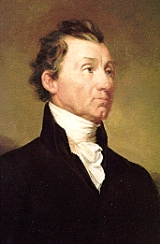
James Monroe
James Monroe was the fifth (1817–1825) President of the United States and the author of the Monroe Doctrine. He was the last President that was a Founding Father.
Sourced
- National honor is the national property of the highest value.
- First Inaugural Address (March 4, 1817)
- The mention of Greece fills the mind with the most exalted sentiments and arouses in our bosoms the best feelings of which our nature is capable.
- Message to Congress (December 1822)
The Monroe Doctrine (December 2, 1823)
- The American continents ... are henceforth not to be considered as subjects for future colonization by any European powers.
- In the wars of the European powers in matters relating to themselves we have never taken any part, nor does it comport with our policy so to do.
- We owe it, therefore, to candor and to the amicable relations existing between the United States and those powers to declare that we should consider any attempt on their part to extend their system to any portion of this hemisphere as dangerous to our peace and safety. With the existing colonies or dependencies of any European power we have not interfered and shall not interfere. But with the Governments who have declared their independence and maintain it, and whose independence we have, on great consideration and on just principles, acknowledged, we could not view any interposition for the purpose of oppressing them, or controlling in any other manner their destiny, by any European power in any other light than as the manifestation of an unfriendly disposition toward the United States.
Unsourced
- A little flattery will support a man through great fatigue.
- If America wants concessions, she must fight for them. We must purchase our power with our blood.
- If we look to the history of other nations, ancient or modern, we find no example of a growth so rapid, so gigantic, of a people so prosperous and happy.
- In this great nation there is but one order, that of the people, whose power, by a peculiarly happy improvement of the representative principle, is transferred from them, without impairing in the slightest degree their sovereignty, to bodies of their own creation, and to persons elected by themselves, in the full extent necessary for the purposes of free, enlightened, and efficient government.
- It is only when the people become ignorant and corrupt, when they degenerate into a populace, that they are incapable of exercising their sovereignty. Usurpation is then an easy attainment, and an usurper soon found. The people themselves become the willing instruments of their own debasement and ruin.
- Never did a government commence under auspices so favorable, nor ever was success so complete.
- Our country may be likened to a new house. We lack many things, but we possess the most precious of all -- liberty!
- Preparation for war is a constant stimulus to suspicion and ill will.
- The best form of government is that which is most likely to prevent the greatest sum of evil.
